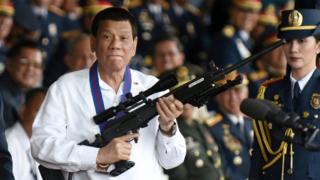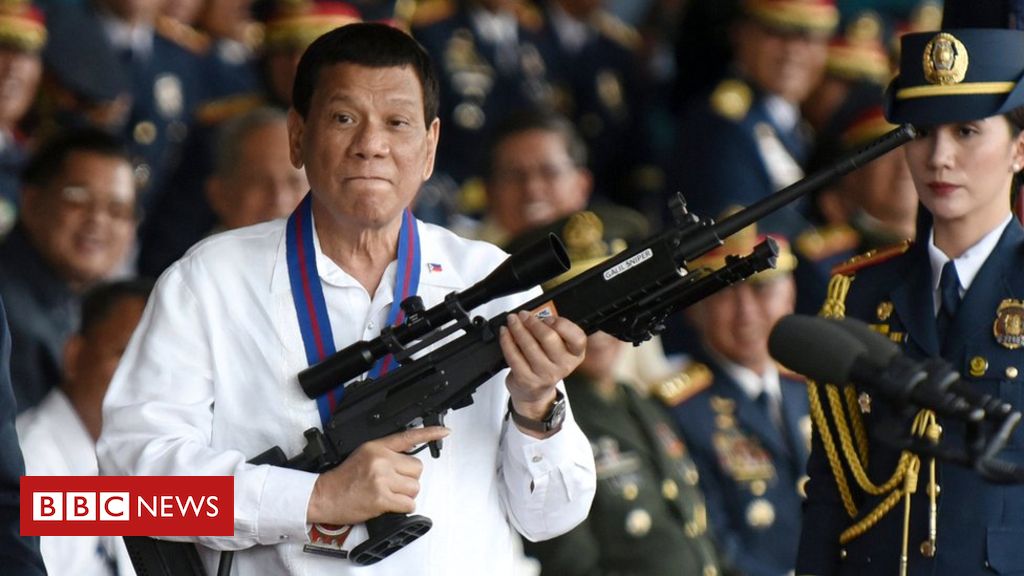 Image copyright
Image copyright
Reuters
Mr Duterte is known for his outspoken views and deadly crackdown on narcotics
Voting is under way in the Philippines, in mid-term polls seen as a popularity test for President Rodrigo Duterte after his first three years in office.
Gaining a Senate majority would allow him to push for constitutional changes and restore the death penalty.
Some 61 million people from more than 7,000 islands are registered to vote in provincial, city and national polls.
Voting began at 06:00 local time (2200 GMT Sunday) and polls will close at 18:00.
Several of Mr Duterte’s children are standing for regional offices, including his daughter Sara who is seeking re-election as mayor of Davao.
Her father governed the city for much of the time since the late 1980s, before becoming president in 2016.
Sara Duterte is tipped by some as her father’s potential successor in 2022.
One of the president’s sons, Sebastian, is running unopposed for vice mayor of Davao, while his eldest son Paolo is seeking a seat in the House of Representatives.
What’s at stake in this vote?
The key battle on Monday is for control of the Senate, the upper house of Parliament, where Mr Duterte does not currently have a majority.
Independent surveys suggest that is now within his reach, however.
The Senate has often served as a check on the president’s more controversial policies, and half of its 24 seats are at stake.
The opposition has been campaigning against Mr Duterte’s war on drugs, which is thought to have killed thousands of drug users and alleged dealers and is widely condemned by rights groups.
‘Opposition aghast at country’s direction’
Howard Johnson, BBC News, Manila
Despite international condemnation of President Duterte’s bloody war on drugs he remains incredibly popular in the Philippines.
A recent opinion poll gave him a 79% approval rating, a figure Western politicians can only dream about halfway through their term in office.
To understand Mr Duterte’s appeal I recently travelled to his political power-base Davao City in the far south of the country.
All across the city are Big Brother-style posters warning criminals and wrong-doers of the heavy-handed response they can expect from the authorities.
Locals tell me they like the president’s iron-fisted style of rule because it scares people into complying with the law.
On a national scale, his senatorial candidates are campaigning for a return of the death penalty for drug traffickers and lowering the age of criminal liability to 12 years old.
The liberal opposition are aghast at such proposals and the direction of the country.
If they fare badly in Monday’s vote, Mr Duterte will gain total control of congress and the ability to pass any legislation he wants.
Image copyright
EPA
President Duterte remains widely popular in the country
The country’s leading opposition is the Liberal Party-led alliance which is campaigning on a progressive stance against the president. They have been vocal in their opposition to the war on drugs and what they say is Duterte’s pursuit of a close relationship with China which they fear could come at the expense of cementing relations with the country’s traditional ally, the United States.
They have put forward eight senatorial candidates and branded themselves Otso Diretso or Straight Eight. While the focus of their campaign is a rejection of Mr Duterte’s values, they also highlight economic issues such as jobs and education.
Nonetheless, opinion polls suggest Monday’s elections will strengthen Mr Duterte and his political allies and that only one of the 12 senate seats up for grabs will go to the opposition.
Results are expected on Friday or next week.
